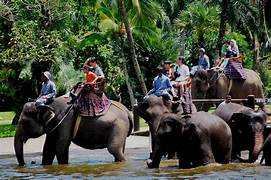
Tripura Set to Launch Its First-Ever Elephant Safari by August 15

 :
| Updated On: 14-Jul-2025 @ 1:24 pm
:
| Updated On: 14-Jul-2025 @ 1:24 pmSHARE
Tripura is gearing up to launch its first-ever elephant safari by August 15, marking a significant step towards promoting eco-tourism and improving human-elephant coexistence in the state. The initiative is spearheaded by the Forest Department, and according to Forest Minister Animesh Debbarma, preparations are in the final stages.
The safari will be based out of the Mungiakami Elephant Camp, where necessary infrastructure upgrades have been made. This includes the construction of an elephant watchtower and the training of elephant watchers to ensure a smooth and safe safari experience. During a recent inspection of the site, Minister Debbarma expressed satisfaction with the progress and instructed officials to complete the remaining tasks before the scheduled launch date.
Initially, the safari will be previewed by senior officials and stakeholders. Their feedback will be used to fine-tune the experience before opening it to the general public. This phased rollout is aimed at ensuring the safari meets high standards of safety, education, and sustainability.
One of the key objectives of the safari is to serve as a solution to the long-standing issue of human-elephant conflict, especially in regions like Khowai district. The district has seen repeated instances of elephants damaging crops and property, leading to tensions between humans and wildlife. To address this, the Forest Department has taken several proactive measures alongside the safari project.
Among these measures is the procurement of non-lethal double-barrel guns specifically designed to safely deter elephants from human settlements without causing them harm. These weapons will be deployed in conflict-prone areas to enhance human safety while preserving the well-being of the elephants. This approach is part of a broader, non-violent conflict management strategy that prioritizes conservation and cohabitation over confrontation.
The government sees the elephant safari as a dual-purpose initiative: it will not only attract tourists and boost eco-tourism in the state, but also raise awareness about the importance of elephant conservation. By offering tourists an opportunity to observe elephants in their natural habitat under controlled, respectful conditions, the project aims to foster greater appreciation and understanding of these majestic animals.
Furthermore, the safari will provide an economic boost to local communities through job creation and increased tourism-related activities. It aligns with the broader vision of using sustainable tourism as a tool for both wildlife conservation and rural development.
The project also highlights the role of traditional knowledge and community participation in conservation efforts. The involvement of trained local personnel in managing the safari ensures that the initiative is rooted in the local context and has community support.
In conclusion, Tripura’s first elephant safari is a well-rounded initiative that blends conservation, tourism, and conflict mitigation. It is expected to become a model for other states facing similar challenges and underscores the importance of integrating ecological wisdom into development planning. If successful, this initiative could pave the way for a more harmonious and sustainable relationship between humans and elephants.